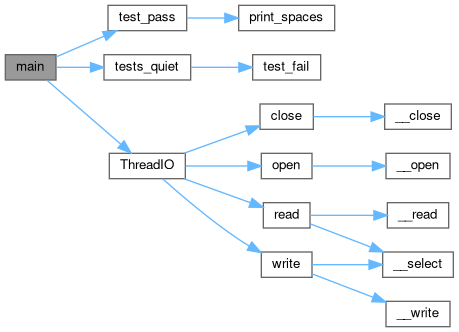Loading...
Searching...
No Matches
Include dependency graph for appio_test_pthreads.c:

Go to the source code of this file.
Macros | |
| #define | NUM_EVENTS 6 |
| #define | NUM_INFILES 4 |
Functions | |
| void * | ThreadIO (void *arg) |
| int | main (int argc, char **argv) |
Variables | |
| const char * | names [NUM_EVENTS] = {"READ_CALLS", "READ_BYTES","READ_USEC","WRITE_CALLS","WRITE_BYTES","WRITE_USEC"} |
| static const char * | files [NUM_INFILES] = {"/etc/passwd", "/etc/group", "/etc/protocols", "/etc/nsswitch.conf"} |
Macro Definition Documentation
◆ NUM_EVENTS
| #define NUM_EVENTS 6 |
Definition at line 24 of file appio_test_pthreads.c.
◆ NUM_INFILES
| #define NUM_INFILES 4 |
Definition at line 27 of file appio_test_pthreads.c.
Function Documentation
◆ main()
Definition at line 93 of file appio_test_pthreads.c.
93 {
94 pthread_t *callThd;
97 pthread_attr_t attr;
98
99 /* Set TESTS_QUIET variable */
100 tests_quiet( argc, argv );
101
105 exit(1);
106 }
107
108
109 pthread_attr_init(&attr);
112 exit(1);
113 }
114#ifdef PTHREAD_CREATE_UNDETACHED
115 pthread_attr_setdetachstate(&attr, PTHREAD_CREATE_UNDETACHED);
116#endif
117#ifdef PTHREAD_SCOPE_SYSTEM
118 retval = pthread_attr_setscope(&attr, PTHREAD_SCOPE_SYSTEM);
121 exit(1);
122 }
123#endif
124
125 numthrds = NUM_INFILES;
128
133 }
135 pthread_attr_destroy(&attr);
136
138 pthread_join(callThd[i], NULL);
139
140 test_pass( __FILE__ );
141 return 0;
142}
initialize the PAPI library.
Initialize thread support in the PAPI library.
FILE * stderr
Definition: papi_fwrappers_.c:1518
Here is the call graph for this function:

◆ ThreadIO()
| void * ThreadIO | ( | void * | arg | ) |
Definition at line 30 of file appio_test_pthreads.c.
30 {
32 if (!TESTS_QUIET) printf("\nThread %#lx: will read %s and write it to /dev/null\n", tid,(const char*) arg);
36 int e;
37 int event_code;
38
39 /* Create the Event Set */
42 exit(2);
43 }
44
49 exit(2);
50 }
54 exit(2);
55 }
56 }
57
58 /* Start counting events */
61 exit(1);
62 }
63
64//if (PAPI_read_counters(EventSet, values) != PAPI_OK)
65// handle_error(1);
66//printf("After reading the counters: %lld\n",values[0]);
67
69 if (fdin < 0) perror("Could not open file for reading: \n");
70
71 int bytes = 0;
73
75 if (fdout < 0) perror("Could not open /dev/null for writing: \n");
78 }
79 close(fdout);
80
81 /* Stop counting events */
84 }
85
89 }
90 return(NULL);
91}
add PAPI preset or native hardware event to an event set
Create a new empty PAPI EventSet.
Convert a name to a numeric hardware event code.
Start counting hardware events in an event set.
Stop counting hardware events in an event set.
Here is the call graph for this function:

Here is the caller graph for this function:

Variable Documentation
◆ files
|
static |
Definition at line 28 of file appio_test_pthreads.c.
◆ names
| const char* names[NUM_EVENTS] = {"READ_CALLS", "READ_BYTES","READ_USEC","WRITE_CALLS","WRITE_BYTES","WRITE_USEC"} |
Definition at line 25 of file appio_test_pthreads.c.